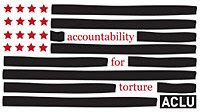It was the first hearing on the government’s evidence for holding detainees at Guantánamo. The judge... said the government’s secret evidence in the case had been weak: what he described as “a classified document from an unnamed source” for its central claim against the men, with little way to measure credibility.Vincent Warren, Executive Director of Center for Constitutional Rights, was released a statement calling the ruling a "major victory."
“To rest on so thin a reed would be inconsistent with this court’s obligation,” Judge Leon said. He urged the government not to appeal and said the men should be released “forthwith.”
This decision makes it clear once again that even with presumptions in its favor, the government cannot muster the barest evidence in support of its arbitrary detentions. For seven years, the Bush administration sought to avoid the courts because it had no evidence and sought instead to create a lawless prison.It should be noted, however, that according to ScotusBlog the judge "found, however, that the government had justified the continued imprisonment of a sixth detainee, Belkacem Bensayah. (The ruling is available here.)" Furthermore:
We must note that justice here, however, comes seven years too late. The restoration of habeas corpus is a great achievement, and what is necessary now is for the government to give up this charade, rescind the ‘enemy combatant’ labels slapped on recklessly by combatant status review tribunals and return the men at Guantanamo to their home countries or, for those needing resettlement or asylum, to a safe third country.
We hope a new administration makes restoring the lives of hundreds of men at Guantanamo who have never been charged with any crime or tried in a court of law a top priority. Guantánamo Bay is a failure by every measure and must be closed immediately.
The judge, in an unusual added comment, suggested to senior government leaders that they forgo an appeal of his ruling on freeing the five prisoners. While conceding that the government had a right to appeal that part of his ruling, Leon commented that he, too, had “a right to appeal” to leaders of the Justice Department, Central Intelligence Agency and other intelligence agencies, and his plea was that they look at the evidence regarding the five he was ordering released. “Seven years of waiting for our legal system to give them an answer to their legal question is enough,” he commented.While this may sound like the judge was fed up with administration meddling -- and he certainly was not happy about the evidence in this case -- his comments about the ruling included a swipe at the Supreme Court's decision in Boumediene.
The judge appeared to be mildly critical of the Supreme Court’s ruling on detainees’ habeas rights, saying that ”the practical effect of imposing the habeas process on the world of intelligence-gathering” is “to create a virtually limitless complex of novel and difficult questions; as a result, the precedential value [of his decision] should be and is limited to these cases.”The defense says it will appeal the ruling on Bensayah.
Overall, this looks like at best a partial victory. It certainly is great for the five Algerian prisoners long held at Guantanamo. But the lack of precedential value, and the backhanded criticism of SCOTUS's habeas rulings, makes this a murky brew indeed. Critics of Bush's GWOT have looked too long to the courts to undo the administration's attacks on civil liberties and its turn to torture practices. It will take massive political action to really put a stop to the attacks on rights coming from Washington.









No comments:
Post a Comment